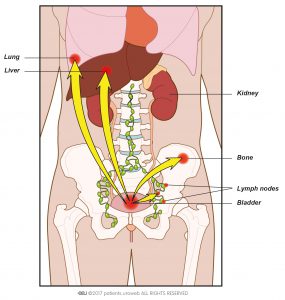Table of Contents
Prognostic factors and treatment decisions
If your bladder cancer has spread to another body organ (Fig. 1), treatment is unlikely to cure you. Treatment options are limited to controlling the spread of disease (metastasis) and reducing symptoms.
Treatment options for metastatic bladder cancer
Chemotherapy
In 90-95% of bladder cancer cases the histological type is urothelial carcinoma. Chemotherapy that contains platinum is the most effective treatment against this type of cancer.
Chemotherapy combinations like MVAC (which uses the drugs methotrexate, vinblastine, Adriamycin [doxorubicin], and cisplatin) or gemcitabine and cisplatin are prescribed most often. These treatments have side-effects that must be considered carefully if you cannot recover from your illness and the goal is to optimise your quality of life. Limited ability to perform daily activities (low performance status), other illnesses, or decreased kidney function could make you ineligible for these chemotherapies.
If you have reduced kidney function and cannot take the drug cisplatin, combinations like gemcitabine and carboplatin or M-CAVI (which uses the drugs methotrexate, carboplatin, and vinblastine) are slightly less effective options for treating bladder cancer.
Should your disease recur or progress while taking these therapies, treatment can be changed to another type of chemotherapy, but since there is no standard in this case, the choice will depend on your treating physician. Additional surgery to remove a metastatic or recurrent tumour mass is used only to relieve pain or obstruction and will not cure the disease. Radiotherapy can also be used to treat symptoms like pain or recurrent bleeding (haematuria).
Some types of chemotherapy are quite intensive and can have a lot of side-effects. If you are not fit or if you feel unwell from the cancer, these side-effects can be quite severe. Older patients in particular may benefit from less intensive types of chemotherapy.
Treatment of bone metastases
When bladder cancer has spread to the bone, skeletal complications can occur, such as weakening of the bones or pathological fractures from minor incidents or everyday activity. This causes pain and can have a detrimental effect on your quality of life. Your doctor may suggest radiotherapy, or drug treatment to help strengthen your bones and control the pain.
Access to clinical trials
All patients with a diagnosis of recurrent or metastatic bladder cancer, and particularly those whose prior chemotherapy has been unsuccessful, should be considered for centres where clinical trials are available.
A limited but increasing number of studies are available in various settings for patients who have never had chemotherapy as well as pre-treated patients. In addition, the recent experimental use of drugs called ‘immune checkpoint inhibitors’ in advanced bladder cancer appears effective in a subset of patients with this disease.
Deciding on treatment
If treatment is intended to slow down the cancer and control the symptoms, deciding what treatment is best for you—or whether to have treatment at all— can be very difficult.
You will need a clear understanding of what drug treatment can do for you at this stage and how it will affect your quality of life.
Talk to family or friends and people who are close to you. It can help to discuss things with someone outside your inner circle. Your doctor may be able to refer you to a counselor or specialist nurse.
Efforts are being made to promote patient advocacy for bladder cancer. Ask your oncologist if a bladder cancer patient representative is available near you.


